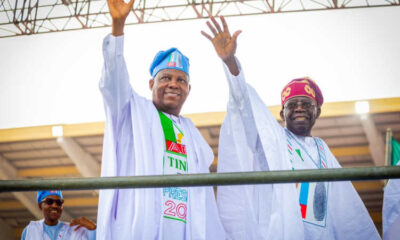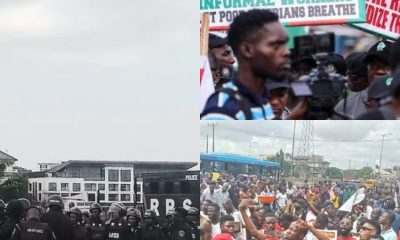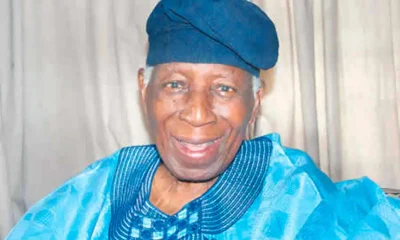News
Akpabio, Lawan, Ndume Throw Nigerian Senate Into Rowdy Session Over N23Trillion Ways & Means Funds Approved By 9th Assembly

The Nigerian Senate was thrown into a rowdy session on Wednesday by the Senate President, Senator Godswill Akpabio, immediate past Senate President, Senator Ahmed Lawan and Senate Chief Whip, Senator Ali Ndume.
There was a mild drama in the Red Chamber as the Senate leaders disagreed over the N23 trillion Ways & Means funds approved by the 9th Assembly under the leadership of former Senate President, Lawan.
Addressing the Senate on the report of the Senate Committee set up to probe the Ways & Means funds approved by the 9th Assembly for former President Muhammadu Buhari’s administration, Akpabio said what the Senate did under the leadership of Lawan had thrown Nigeria into a more economic mess.
Directly asking Lawan to speak on the issue, Akpabio said, “We are saying what you did at that time has put the nation in more mess economically. Therefore, because of the current economic situation we have found ourselves, there is the need for us to look at the details to know whether they were rightly spent.”
Lawan said there is nothing that the National Assembly that makes laws cannot look into and review.
He said that if there were expenditures wrongly done in contradiction to the provision of the constitution, the National Assembly could look at the expenditures and if sanctions were needed for unlawful actions or unauthorised expenditures, the National Assembly would provide the sanctions.
The former Senate President argued: “What the 9th National Assembly approved or rectified in terms of Ways & Means was not N29 trillion or N30 trillion, it was N22 trillion. But there was N819 billion to attend to, deal with and address very serious infrastructure dilapidations that we had across the country.
“If we have a Ways & Means that is N30 trillion today, that means something happened between then and now, and it is for the National Assembly to find out what happened.”
Lawan insisted that nobody in the chamber should suggest that the Assembly should not look into what they feel is in the public interest, “but what Nigerians want today is food and security”.
“This (Ways & Means issue) belongs to the medium or long-term action that we need to take. How are we going to provide food for Nigerians and protect their lives?
“Let us not put the cart before the horse. Let’s consider it necessary to look at what happened in the past, but we in the present and the present is so unpleasant and we have to act very swiftly,” he said.
Responding to Lawan’s submission, Akpabio said, “Even though the Ways & Means were part of the things that put us where we are today, we are saying that expenses that were not explained, that we don’t have details about put us in the indebtedness that we are seeing today.”
Akpabio noted that it has affected the ability of the government to provide essential needs and services to Nigerians and that the National Assembly needs to look into it.
He however agreed that Nigerians are currently faced with a food crisis and they need to act immediately to put food on the table of Nigerians.
Akpabio said, “What we got to N30 trillion was because of the interest element. They brought that before this current Senate, that the interest has accrued to the N23 trillion that was passed by the 9th Senate and that they needed additional N7 trillion which was the interest. We passed the interest and that is what was added to make it N30 trillion.”
Speaking further, Akpabio confronted the Senate Chief Whip, Ndume, that he was part of the 9th Senate that approved the Ways & Means, but Ndume quickly denied being involved in its approval.
Ndume said, “I was not there; check the record. You cannot approve illegality. What they did was illegal. The Senate doesn’t have the right, let it be on record.”
Ndume’s denial of being part of lawmakers who approved the Ways & Means in the 9th Senate threw the session into rowdiness as some of the lawmakers insisted that Ndume was involved.
Ndume argued that the Senate only has the right of approval but doesn’t have the right to rectify when money has been spent.
“We don’t have the right to rectify, we only have the right to approve,” he said.
He further said that the 9th Senate only approved N819 billion and that the details of other funds that had been spent should be provided.
He said, “It has never been provided till date. This committee should find out what happened to the money. People must be held responsible and they should come and explain to this Senate what they did with the money. Now is the time that people are looking for their money everywhere, where is that money?”
Akpabio sarcastically said, “I want you to know that Senator Ndume cannot remember being there when the thing happened.”
The Senate President said that what the Senators from the 9th Senate were saying was that the total amount of N30 trillion was brought before them for approval, however, they left a caveat that they could approve the funds but they needed details and that till date, the details had not been provided.
On his part, Senator Mustapha Habib representing Jigawa South West Senatorial District said that in addition to the Ways & Means, there were loans given to state governments and the manufacturing sector, some of which had not been returned.
“We have a colossal amount of money given to the banks and this amount ran into trillions of Naira. We need to really interrogate this. DisCos (Electricity dictribution companies) were also given money by the CBN (Central Bank of Nigeria). This money needs to be returned to CBN,” he said.
News
Nigerian Army ‘Destr0ys Over 70 Bandits Dens In Taraba, Wastes Three Terrorists’

During the operation, three terrorists were reportedly eliminated, and security forces recovered firearms and logistical supplies.
The Nigerian Army says it has destroyed over 70 camps used by bandits in Taraba State, as part of a continued effort to combat terrorism in the region.
During the operation, three terrorists were reportedly eliminated, and security forces recovered firearms and logistical supplies.
SaharaReporters learnt that the military engaged the terrorists at a hideout in Achelle, situated within the Karim Lamido Local Government Area, as part of their ongoing efforts to dismantle the remaining elements of terrorist groups in the state.
Captain Oni Olubodunde, spokesperson for the 6 Brigade of the Nigerian Army in Jalingo, confirmed the operation, stating that its primary objective was to identify and neutralise dangerous criminals active in the area.
Olubodunde further reported that, in addition to eliminating the three terrorists, security personnel seized an AK-47 rifle, ammunition, and two motorcycles during the operation, which took place on April 5, 2025.
“In continuation of Operation Lafiya Jama’a, a military offensive to remove criminal elements from Taraba State, the brave troops of the 6 Brigade Nigerian Army and Sector 3 Operation Whirl Stroke (OPWS) successfully neutralised three bandits, destroyed several camps, and seized weapons and ammunition during a daring clearance operation conducted in the Karim Lamido Local Government Area on April 5, 2025,” said Olubodunde.
The operation targeted suspected bandit hideouts, beginning in Achelle, where troops carried out a thorough sweep before advancing to Chibi.
As forces reportedly approached Chibi, the bandits attempted to escape but were intercepted. In the ensuing clash, three bandits were eliminated, and multiple makeshift camps were destroyed. Security personnel also seized two motorcycles, an AK-47 magazine, and 13 rounds of 7.62mm special ammunition.
Furthermore, troops conducted extensive searches in the Dutsen Zaki and Achalle areas, where over 70 criminal camps have been dismantled in recent weeks.
According to Olubodunde, no signs of human activity were detected during this latest operation, underscoring the effectiveness of previous security efforts.
Brigadier General Kingsley Chidiebere Uwa, Commander of the 6 Brigade Nigerian Army, praised the troops for their dedication and strategic execution. He reassured the people of Taraba State that terrorists and criminals would find no refuge in the region.
General Uwa also urged residents to remain vigilant while going about their daily activities without fear. He emphasised the importance of maintaining law and order.
He encouraged the public to provide timely and credible information to security agencies, stressing that such cooperation is essential for ensuring the safety of local communities.
News
Herdsmen Storm Benue Hometown Of Ex-Senate President David Mark

Armed herdsmen in their continuous assault on Benue State communities have attacked Otobi Community in the Otukpo Local Government Area of the state, forcing residents to abandon their homes, farms and flee.
Otobi is the hometown of former Senate President, David Mark.
Mark, a retired Brigadier-General, served as the 12th President of the Nigerian Senate from 2007 to 2015 and was the longest serving Senate President.
Sources at the weekend revealed that the villagers, currently under attack, are now evacuating from their homes.
“Herdsmen are killing residents of Otobi in Otukpo LGA Benue State. They killed one last night and went round the community shooting. They are promising to attack again tonight,” a top source revealed.
“Villagers are evacuating. There is panic everywhere. This is same community where David Mark came from,” another source added.
The insecurity situation in Benue has been alarming in recent weeks with attacks from gunmen suspected to be herdsmen.
Recall during the week reported that some gunmen killed two persons and abducted 13 passengers near the Otukpo Burnt Bricks area in Otukpo Local Government Area.
The development was confirmed by the management of Benue Links Nigeria Limited in a statement issued by the company’s Information Officer, Johnson Daniel.
He had said efforts were ongoing to rescue the abducted passengers.
Confirming the incident, the Police Spokesperson for Benue State, SP Anene Sewuese Catherine, had acknowledged the attack and stated that more details would be provided soon.
“A kidnap incident involving a Benue Links vehicle has been reported. More details will be made available shortly,” she had said.
News
Nigerians to pay less for petrol as oil prices drop to $65 per barrel

There are indications that Nigerians would pay less for the Premium Motor Spirit, PMS, also known as petrol, as the price of Brent dropped to $65 per barrel from $69.90 per barrel in the global market.
The price of Brent is used globally to benchmark the prices of other crudes – major feedstocks – and by extension petroleum products prices.
Checks by Sunday Vanguard indicated that the development was partly fueled by the U.S. President Donald Trump’s announcement of sweeping new tariffs.
The checks further showed that it was also fueled by the decision of the Organisation of Oil Producing Countries and its allies to increase oil output by 410,000 barrels per day starting May 2025 far above the 135,000 barrels originally planned.
Slash
Already, the depot prices of Mainland, A.Y.M and Ever have dropped to N918 per litre from N920 and N919 from N920 per litre, respectively.
Also, the depot prices of Prudent, Eterna and Soroman have dropped to N912 from N913 per litre, N897 from N900 per litre and N915 from N916 per litre, respectively.
According to petroleumprice.ng, oil marketers would likely adjust their pump prices downwards as they get new supplies this week, if the current market condition persists.
Fares
In a telephone interview with Sunday Vanguard, weekend, the President of Petroleum Products Retail Outlets Owners Association of Nigeria, PETROAN, Billy Gillis-Harry, expressed optimism that the development would culminate in low costs of fares, goods and services if the fundamentals persist in the market.
Meanwhile, in a report, OPEC stated: “The eight OPEC+ countries, which previously announced additional voluntary adjustments in April and November 2023, namely Saudi Arabia, Russia, Iraq, UAE, Kuwait, Kazakhstan, Algeria, and Oman met virtually on 3 April 2025, to review global market conditions and outlook.
“In view of the continuing healthy market fundamentals and the positive market outlook, and in accordance with the decision agreed upon on 5 December 2024, subsequently reaffirmed on 3 March 2025, to start a gradual and flexible return of the 2.2 million barrels per day voluntary adjustments starting from 1 April 2025, the eight participating countries will implement a production adjustment of 411 thousand barrels per day, equivalent to three monthly increments, in May 2025.
“This comprises the increment originally planned for May in addition to two monthly increments. The gradual increases may be paused or reversed subject to evolving market conditions. This flexibility will allow the group to continue to support oil market stability. The eight OPEC+ countries also noted that this measure will provide an opportunity for the participating countries to accelerate their compensation.
“The eight countries reaffirmed their commitment to the voluntary production adjustments agreed at the 53rd Joint Ministerial Monitoring Committee, JMMC meeting on 3 April 2024. They also confirmed their intention to fully compensate any overproduced volume since January 2024 and to submit updated front-loaded compensation plans to the OPEC Secretariat by 15 April 2025.”
-

 Politics6 hours ago
Politics6 hours agoTinubu Gives Fani Kayode, Others New Appointments (See Full List)
-

 News6 hours ago
News6 hours agoDANGER! Ex-Soldier Abubakar Affan Vows to Kill VeryDarkMan ‘Like Deborah Samuel’
-

 News21 hours ago
News21 hours agoSecurity Alert: Police alert officers ahead of nationwide protest over living costs, free speech
-

 News9 hours ago
News9 hours agoWhy NYSC maybe extended by FG- Minister
-

 News19 hours ago
News19 hours agoVOA Halts Operations In Nigeria, Others Over President Trump
-

 News8 hours ago
News8 hours agoIbas moves to rehabilitate damaged Rivers LG secretariats
-

 Economy9 hours ago
Economy9 hours agoCBN allocates $197.71m into FX market to support naira
-

 News6 hours ago
News6 hours agoJust in: Ex-Oyo governor, Olunloyo is dead






